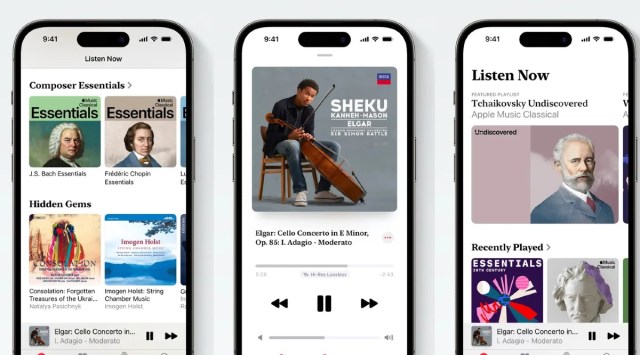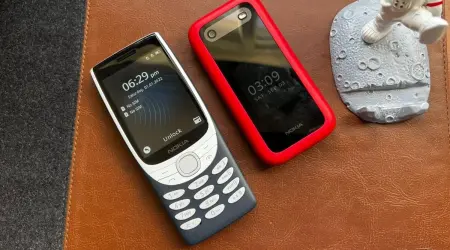- India
- International
Apple Music Classical to launch on March 28: Here’s everything you need to know
Apple has finally announced that the Apple Music Classical will be launched on March 28. Here's everything you need to know about it from streaming quality to supported devices.
 The new app will come as a standalone release in the App Store and can be accessed with the standard Apple Music subscription. (Image: Apple)
The new app will come as a standalone release in the App Store and can be accessed with the standard Apple Music subscription. (Image: Apple) Back in 2021, Apple acquired classic music streaming platform PrimePhonic, announcing that another music app called Apple Music Classic dedicated to the genre would be launched in 2022. While that did not happen, new clues kept emerging every now and then showing that the Cupertino company was indeed working on the app behind closed curtains.
Recently, Apple broke the silence by announcing that Apple Music Classical will be launched on March 28. You can pre-register for the upcoming app from the App Store now. Here’s everything to know about it ahead of the launch.
What is Apple Music Classical
From the press release, Apple Music Classical “is the ultimate classical experience with hundreds of curated playlists, thousands of exclusive albums, insightful composer biographies, deep-dive guides for many key works, intuitive browsing features and much more.”
In other words, it’s a variation of Apple Music that caters to classical music alone. It will offer 5 million tracks and works from new releases to celebrated masterpieces. Complete and accurate metadata will be shown for each track alongside thousands of editorial notes including composer biographies, descriptions of key works, and more.
An iPhone exclusive
It has been confirmed that Apple Music Classical will only be coming to iPhones and will be compatible with iOS 15.4 or later. That means it’ll be compatible with iPhones 6s and later. However, that also means that iPad and macOS have been left out, at least for now.

Apple hasn’t announced any plans to bring the app to its other operating systems as of yet but considering that the ‘vanilla’ Apple Music app is available on all platforms, the Classical app will likely be as well. An Android app is also in the pipeline, so an Apple device is not necessary to be able to listen to glorious symphonic music.
Streaming bandwidth and music quality
In May 2021, Apple announced that it will begin offering lossless audio on Apple Music in June 2021. The company thereafter upgraded its entire streaming music catalogue to lossless audio using the ALAC (Apple Lossless Audio Codec) format.
Just like Apple Music, Apple Music Classical’s streaming quality will be as good as it can get, with support for up to 24bit 192kHz bitrates and Spatial Audio. That bitrate does require supporting audio devices, though, so you’ll likely need a pair of AirPods for the best results. External DAC is usually recommended to fully experience 24bit 192kHz. And the best option for that right now is probably Apple’s own Lightning to 3.5mm Headphone Jack Adapter which retails for Rs 900.
Things are less clear on the Android end, though. It is obvious that Apple Music Classical will also support lossless on the platform, but not all Android devices may be eligible. The regular Apple Music app asks for Dolby Atmos support on Android in order for Spatial Audio to work and it’s likely that Apple Music Classical will too.
Apple Music Classical interface
Apple likes to keep things seamless across its software and Apple Music Classical will be no different. The app interface looks identical to Apple Music, with the main difference being that it’ll offer nothing but classical music.
However, the now-playing screen features an info tab instead of lyrics that will dive deeper into the music and the composer, with detailed descriptions of the piece you are listening to. The app icon is also obviously unique to help you tell one from the other, with a treble clef instead of the usual music symbol.
Why offer a separate app?
The biggest question raised with the introduction of Apple Music Classical is: why bother to create a separate app when all Classical music can directly be uploaded to the existing Apple Music app?
One reason is it could have something to do with how different classical music’s metadata is from modern music. There’s also a difference in payout methods. Primephonic paid artists based on the time streamed rather than the number of tracks streamed, which makes sense for classical music because it’s usually a lot lengthier than modern pop music. But whether Apple honours this payout structure remains to be seen.
The second is searching for music. Classical music typically has an original composer and then many different versions of that piece of music from different artists. To make searching for a track from a specific artist, Apple Music will likely offer different search parameters making the process easier.
More Tech
May 19: Latest News
- 01
- 02
- 03
- 04
- 05





























